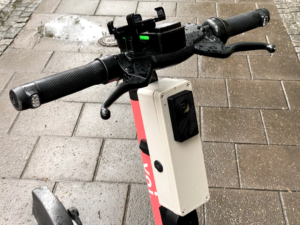Voi has partnered with Irish vision technology firm Luna to pilot computer vision for e-scooters, the trial will use artificial intelligence to detect when an e-scooter leaves the road, rides on a pavement, or parks incorrectly.
Voi e-scooters fitted with the new technology were tested on Stockholm streets in advance of deployment in Northampton later this month. The micromobility partnership said the pilot aims to demonstrate the potential of the technology which will increase the safety of e-scooters by fixing the problem of pavement riding.
The technology will also provide tools to identify problem areas and adapt infrastructure for micromobility, by conveying real-time data about how the vehicles are being used.
‘Smart camera’ hardware and electronics have been honed by Luna and Voi over the last six months, to integrate with the latest Voi vehicles. While the computer vision algorithms have been trained extensively using hours of video footage from Northampton.
Read more: Voi adds AI and computer vision to e-scooters to detect pedestrians
Fredrik Hjelm, CEO of Voi Technology, said: “With computer vision e-scooters can be trained to see and recognise situations that are hazardous. This world-first pilot will set new standards of safety for this new form of transport.
“We are very proud to be the first e-scooter operator to incorporate the computer vision technology at scale for the benefit of our riders, pedestrians and authorities.”

Voi will initially install cameras on a number of e-scooters in Northampton for a two-phase pilot starting this month.
In the first phase, a controlled user group will road test the computer vision technology to collect real-time visual information on the environment the e-scooter is travelling through, as well as detecting pedestrians in the path of the e-scooter.
The technology will also be able to detect the surface that an e-scooter is being ridden on, such as a bike lane, pavement, or roadway, and alert the rider accordingly with an audible alarm if they are riding on the footpath.
In the second phase of the trial later in the summer, 100 cameras will be installed on the publicly available scooter fleet in Northampton. As well as the audible alert, this phase of the pilot will explore the potential to automatically slow scooters if inappropriate riding is detected on footpaths or in heavily pedestrianised areas.
Andrew Fleury, CEO of Luna, added: “With this trial, we look forward to demonstrating how computer vision equipped e-scooters can make a verifiable difference to rider compliance and sidewalk riding behaviour in cities.
“We’ve noticed cities across the world requesting technological solutions to challenges like pavement riding and it’s fantastic to be working with such a safety conscious operator like Voi, in order to develop market ready solutions.”




